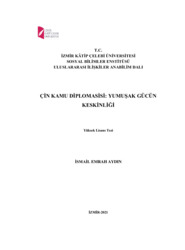Çin kamu diplomasisi: yumuşak gücün keskinliği Chinese public diplomacy: the sharpness of soft power
-
Eser Sahibi
Aydın, İsmail Emrah
- Tez Danışmanı Seçkin Barış Gülmez
-
Tür
Yüksek Lisans
- Yayın Tarihi 2021
-
Yayıncı
İzmir Katip Çelebi Üniversitesi Sosyal Bilimler Enstitüsü
- Tek Biçim Adres https://hdl.handle.net/11469/2875
-
Konu Başlıkları
Public administration - China
Kamu yönetimi - Çin
ÖZETBirinci sanayi devrimi ve coğrafi keşifler sonrası kurulan Batı merkezli küresel düzen, dördüncü sanayi devrimi arifesinde yaşanan birtakım gelişmeler ışığında yeniden sorgulanmaya başlanmıştır. Bu noktada özellikle 5G, yapay zekâ ve nesnelerin interneti gibi alanlarda ön plana çıkarak küresel liderlik mücadelesi veren Çin, günümüzde pek çok tartışmanın odağında yer almıştır. Bu çalışma, bu tartışmalardan biri olan, Kamu Diplomasisi uygulamaları bağlamında, 'Çin, yumuşak güç mü, yoksa keskin güç mü?' olduğu sorusunu cevaplamayı amaçlamaktadır. Bu doğrultuda, 'yumuşak güç' ve 'keskin güç' kavramları, hem kavramsal çerçeve hem de Çin Kamu Diplomasisi faaliyetleri ile kapsamlı bir şekilde karşılaştırılmış ve ABD-Çin ticaret savaşları ve hegemonya mücadelesinin Huawei, 5G ve sağlık diplomasisi çerçevesinde arka planı ortaya konmaya çalışılmıştır. Bu tez, 6 bölümden oluşmaktadır. İlk üç bölüm, 'propaganda-kamu diplomasisi' ve 'yumuşak güç – keskin güç' kavram karşılaştırmaları ve Çin Kamu Diplomasisinin genel bir değerlendirmesine yönelik literatür tartışmalarından oluşmaktadır. Diğer üç bölüm, ABD-Çin ticaret savaşları, Huawei şirketi üzerinden 5G mücadelesi ve Covid-19 pandemisinin doğurduğu ortamda 'sağlık diplomasisi' olgularına dair ampirik tartışmaları kapsamaktadır. Bu tez, literatüre 'yumuşak güç-keskin güç' kavramlarının kapsamlı karşılaştırması yönünden teorik, kavramsal tartışmaların arka planı olarak 5G ve ticaret savaşlarının ortaya konması ve 'sağlık diplomasisi' ve 5G mücadelesinin karşılaştırılması yoluyla orijinal iki ampirik katkı olmak üzere üç katkıda bulunmayı amaçlamaktadır. Bu tezin ana argümanı, özellikle Çin'e atfedilen 'keskin güç' kavramının akademik olmaktan çok siyasi bir kavram olduğu ve küresel hegemonya savaşının kavramsal boyutunun bir yönünü oluşturduğudur.ABSTRACTThe Western-led global order established after the first industrial revolution and the geographic discoveries, has been challenged by the new developments in World politics on the eve of the fourth industrial revolution. In this respect, striving for global leadership through 5G, artificial intelligence and internet of objects, China has become the focus of numerous debates today. In line with those debates, this study aims to answer the question of 'whether China has a soft power or a sharp power.' Accordingly, it compares the terms 'soft power' and 'sharp power' both through a conceptual framework analysis and by offering an empirical discussion of China's public diplomacy engagements with a particular focus on the cases of Huawei, 5G and health diplomacy revealing the persistent struggle for hegemony between the US and China. This thesis consists of 6 chapters. The first three chapters discuss the existing scholarly literature on 'propaganda - public diplomacy', 'soft power – sharp power' and Chinese public diplomacy, respectively. The next three chapters comprise of empirical discussions regarding the US-China trade wars, the 5G struggle over the Huawei company and 'health diplomacy' in response to the Covid-19 pandemic. This thesis aims to make three main contributions to the scholarly literature. First, it aims to make a theoretical contribution by offering a comprehensive comparison of the terms 'soft power' and 'sharp power'. Second, in line with these conceptual discussions, it will offer an empirical contribution through a comprehensive discussion of 5G and the trade wars. Finally, the thesis will make an empirical contribution by comparing the 5G case with 'health diplomacy'. The main argument of this thesis is that the concept of 'sharp power', especially attributed to China, is more of a political concept than an academic one, and it forms an aspect of the conceptual dimension of the global hegemony war.
-
Koleksiyonlar
ENSTİTÜLER
SOSYAL BİLİMLER ENSTİTÜSÜ

 Tam Metin
Tam Metin

